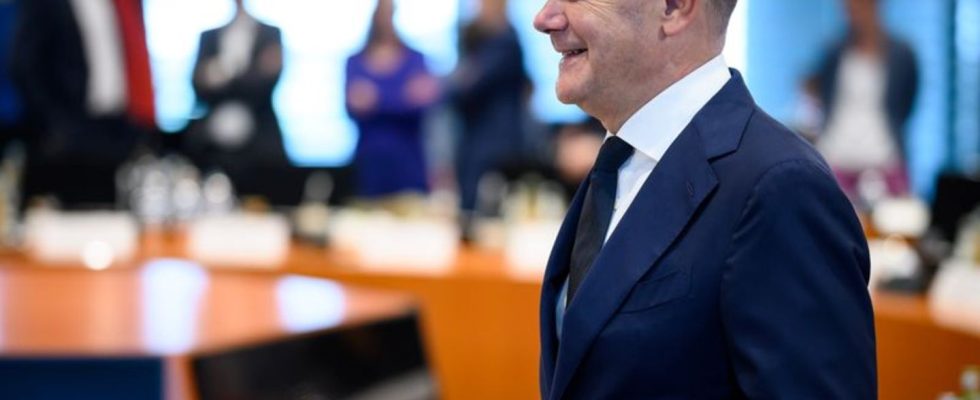This time things are not going as hotly as at the last prime ministers’ conference with the chancellor. At that time, the federal and state governments were arguing about the migration costs. However, the federal states still criticize the federal government.
The federal and state governments want to finally tackle the planning acceleration that has long been agreed, for example for traffic routes, power lines or industrial plants. “It is the joint will of the federal states and the federal government that we streamline all decision-making processes in Germany, that we can get results faster,” said Chancellor Olaf Scholz (SPD) in Berlin after consultations with the prime ministers of the 16 federal states.
After the very controversial special conference on refugee costs in May, both sides emphasized that the talks had been very constructive. “It was really one of the good sessions,” said Lower Saxony’s Prime Minister Stephan Weil (SPD), who is currently chairing the Prime Ministers’ Conference.
planning acceleration
According to Scholz, a working group should be set up quickly to accelerate the process. Weil said there should be a special conference after the summer break. Even before the Prime Ministers’ Conference began, the federal states had put pressure on the federal government to finally start implementing it. Things “got out of hand over the years and decades,” Weil said after the conversation. Even medium-sized infrastructure projects would be true generational tasks. “We have to become faster, we have to become simpler, and by the way, that will also make us cheaper.”
NRW Prime Minister Hendrik Wüst (CDU) emphasized: “A state that implements its projects quickly has more trust from its citizens than a state that takes a very, very long time for many small things.” According to Scholz, the pace at which the LNG terminals were built last year should become the “Germany pace” for all areas. Before the meeting with the chancellor, Wüst had complained: “Germany’s speed is good, but it doesn’t work when the cruise control is set to zero km/h.”
energy
According to Scholz, the federal and state governments have agreed to set up a hydrogen network in Germany. The necessary decisions should be made this year, said Scholz. “It’s a big economic project.” It’s about getting the “core network” done now, “so that companies can make decisions that they rely on hydrogen because they know they’ll have it when they need it (…)”. According to Scholz, a “joint monitoring process” for the expansion of renewable energies in Germany was also agreed.
The prime ministers expressed concern about the energy prices for German industry, especially for energy-intensive companies that are in international competition. They warned that these are often no longer competitive. And they called on the federal government to take countermeasures. “We, as 16 countries, have urged the federal government to take action quickly at this point because we fear that otherwise we would actually lose economic substance,” said Weil. It’s not just about very large companies, but also about medium-sized industrial companies.
refugees
The federal and state governments unanimously welcomed the EU asylum compromise as a step forward. The implementation will take time, said Wüst. “Conversely, this also means that this summer, maybe even next summer, there will not be the relief that we urgently need.” Daycare centers and schools remained overburdened. Wüst emphasized that the working group used to allocate costs was “working well”. A decision should then be made in November.
According to the latest EU plans, tougher treatment of migrants with no prospects of staying is envisaged. The EU interior ministers also agreed on a binding solidarity mechanism when taking in refugees.
Scholz encourages the federal states to quickly digitize their immigration authorities completely. This helps to exchange data and to keep and control the overview of migration to Germany. At the same time, all decision-making processes could take place as quickly as possible. Thank you very much for a joint decision on this, said Scholz. “Because it’s a big push that everyone has to give themselves. It’s a gigantic modernization task that also involves investments and a lot, a lot of work.”
Wüst emphasized: “It will be a huge effort for many municipalities.” According to Weil, the federal and state governments have agreed on a roadmap for the digitization of the authorities, “which is also taken seriously by all those involved”.
National Security Strategy
After criticism from the federal states, the federal government has now agreed to involve them in the implementation of the national security strategy. Wüst reported that the federal government had assured that it would “closely involve” the federal states. The countries would seize the opportunity to get involved. “It would have been good if the countries had been included earlier,” said Wüst. Because they have responsibilities for internal security, cyber security and disaster and civil protection.
On Wednesday, the federal cabinet decided on a security strategy in which for the first time all security-related issues, from the equipment of the Bundeswehr to the fight against climate change and civil protection, are linked.

